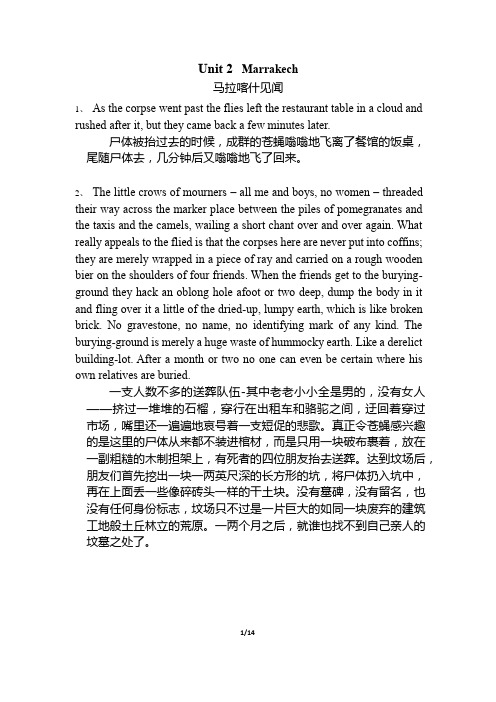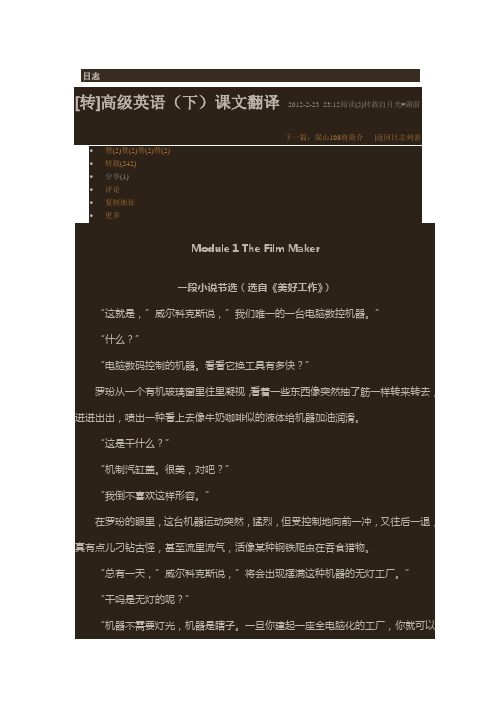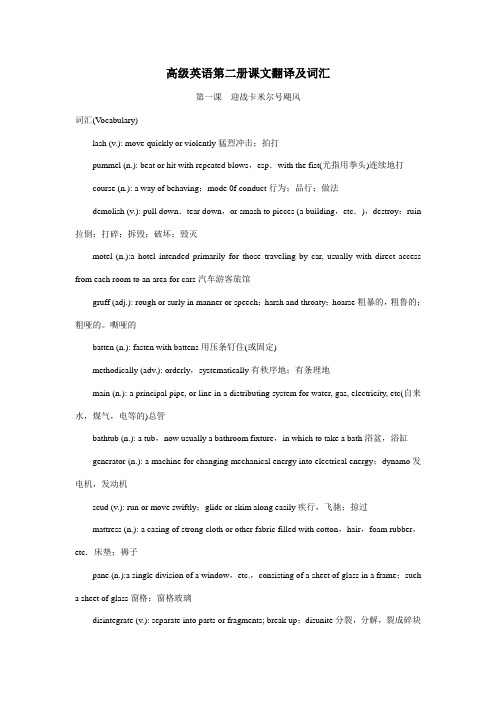高级英语第二次课文需背诵翻译部分原文+译文
高级英语第二册课文翻译及词汇

高级英语第二册课文翻译及词汇第一课迎战卡米尔号飓风词汇(Vocabulary)lash (v.): move quickly or violently猛烈冲击;拍打pummel (n.): beat or hit with repeated blows,esp.with the fist(尤指用拳头)连续地打course (n.): a way of behaving;mode 0f conduct行为;品行;做法demolish (v.): pull down.tear down,or smash to pieces (a building,etc.),destroy:ruin 拉倒;打碎;拆毁;破坏;消灭motel (n.):a hotel intended primarily for those traveling by car, usually with direct access from each room to an area for cars汽车游客旅馆gruff (adj.): rough or surly in manner or speech;harsh and throaty;hoarse粗暴的,粗鲁的;粗哑的。
嘶哑的batten (n.): fasten with battens用压条钉住(或固定)methodically (adv.): orderly,systematically有秩序地;有条理地main (n.): a principal pipe, or line in a distributing system for water, gas, electricity, etc(自来水,煤气,电等的)总管bathtub (n.): a tub,now usually a bathroom fixture,in which to take a bath浴盆,浴缸generator (n.): a machine for changing mechanical energy into electrical energy;dynamo发电机,发动机scud (v.): run or move swiftly;glide or skim along easily疾行,奔驰;掠过mattress (n.): a casing of strong cloth or other fabric filled with cotton,hair,foam rubber,etc.床垫;褥子pane (n.):a single division of a window,etc.,consisting of a sheet of glass in a frame;such a sheet of glass窗格;窗格玻璃disintegrate (v.): separate into parts or fragments; break up;disunite分裂,分解,裂成碎块blast (n.): a strong rush of(air or wind)一股(气流);一阵(风)douse (n.): plunge or thrust suddenly into liquid;drench; pour liquid over把…浸入液体里;使浸透;泼液体在…上brigade (n.): a group of people organized to function。
高级英语2第三版_张汉熙_课文翻译

Unit 2 Marrakech一具尸体抬过,成群的苍蝇从饭馆的餐桌上嗡嗡而起追逐过去,但几分钟过后又飞了回来。
一支人数不多的送葬队伍——其中老少尽皆男性,没有一个女的——沿着集贸市场,从一堆堆石榴摊子以及出租汽车和骆驼中间挤道而行,边走边悲痛地重复着一支短促的哀歌。
苍蝇之所以群起追逐是因为在这个地方死人的尸首从不装进棺木,只是用一块破布裹着放在一个草草做成的木头架子上,有四个朋友抬着送葬。
朋友们到了安葬场后,便在地上挖出一个一二英尺深的长方形坑,将尸首往坑里一倒。
再扔一些像碎砖头一样的干土块。
不立墓碑,不留姓名,什么识别标志都没有。
坟场只不过是一片土丘林立的荒野,恰似一片已废弃不用的建筑场地。
一两个月过后,就谁也说不准自己的亲人葬于何处了。
当你穿行也这样的城镇——其居民20万中至少有2万是除开一身聊以蔽体的破衣烂衫之外完全一无所有——当你看到那些人是如何生活,又如何动辄死亡时,你永远难以相信自己是行走在人类之中。
实际上,这是所有的殖民帝国赖以建立的基础。
这里的人都有一张褐色的脸,而且,人数书如此之多!他们真的和你意义同属人类吗?难道他们也会有名有姓吗?也许他们只是像彼此之间难以区分的蜜蜂或珊瑚虫一样的东西。
他们从泥土里长出来,受哭受累,忍饥挨饿过上几年,然后有被埋在那一个个无名的小坟丘里。
谁也不会注意到他们的离去。
就是那些小坟丘本身也过不了很久便会变成平地。
有时当你外出散步,穿过仙人掌丛时,你会感觉到地上有些绊脚的东西,只是在经过多次以后,摸清了其一般规律时,你才会知道你脚下踩的是死人的骷髅。
我正在公园里给一只瞪羚喂食。
动物中也恐怕只有瞪羚还活着时就让人觉得是美味佳肴。
事实上,人们只要看到它们那两条后腿就会联想到薄荷酱。
我现在喂着的这只瞪羚好象已经看透了我的心思。
它虽然叼走了拿在手上的一块面包,但显然不喜欢我这个人。
它一面啃食着面包,一面头一低向我顶过来,再啃一下面包又顶过来一次。
它大概还因为把我赶开之后那块面包仍会悬在空中。
(完整版)高级英语第二册课文翻译

高级英语第二册课文翻译Unit1 Pub Talk and the King's English酒吧闲聊与标准英语亨利?费尔利人类的一切活动中,只有闲谈最宜于增进友谊,而且是人类特有的一种活动。
动物之间的信息交流,不论其方式何等复杂,也是称不上交谈的。
闲谈的引人人胜之处就在于它没有一个事先定好的话题。
它时而迂回流淌,时而奔腾起伏,时而火花四射,时而热情洋溢,话题最终会扯到什么地方去谁也拿不准。
要是有人觉得“有些话要说”,那定会大煞风景,使闲聊无趣。
闲聊不是为了进行争论。
闲聊中常常会有争论,不过其目的并不是为了说服对方。
闲聊之中是不存在什么输赢胜负的。
事实上,真正善于闲聊的人往往是随时准备让步的。
也许他们偶然间会觉得该把自己最得意的奇闻轶事选出一件插进来讲一讲,但一转眼大家已谈到别处去了,插话的机会随之而失,他们也就听之任之。
或许是由于我从小混迹于英国小酒馆的缘故吧,我觉得酒瞎里的闲聊别有韵味。
酒馆里的朋友对别人的生活毫无了解,他们只是临时凑到一起来的,彼此并无深交。
他们之中也许有人面临婚因破裂,或恋爱失败,或碰到别的什么不顺心的事儿,但别人根本不管这些。
他们就像大仲马笔下的三个火枪手一样,虽然日夕相处,却从不过问彼此的私事,也不去揣摸别人内心的秘密。
有一天晚上的情形正是这样。
人们正漫无边际地东扯西拉,从最普通的凡人俗事谈到有关木星的科学趣闻。
谈了半天也没有一个中心话题,事实上也不需要有一个中心话题。
可突然间大伙儿的话题都集中到了一处,中心话题奇迹般地出现了。
我记不起她那句话是在什么情况下说出来的——她显然不是预先想好把那句话带到酒馆里来说的,那也不是什么非说不可的要紧话——我只知道她那句话是随着大伙儿的话题十分自然地脱口而出的。
“几天前,我听到一个人说‘标准英语’这个词语是带贬义的批评用语,指的是人们应该尽量避免使用的英语。
”此语一出,谈话立即热烈起来。
有人赞成,也有人怒斥,还有人则不以为然。
高级英语2第三版 unit2 课文翻译+课后英译汉部分划线

Unit 2 Marrakech马拉喀什见闻1、As the corpse went past the flies left the restaurant table in a cloud and rushed after it, but they came back a few minutes later.尸体被抬过去的时候,成群的苍蝇嗡嗡地飞离了餐馆的饭桌,尾随尸体去,几分钟后又嗡嗡地飞了回来。
2、The little crows of mourners – all me and boys, no women – threaded their way across the marker place between the piles of pomegranates and the taxis and the camels, wailing a short chant over and over again. What really appeals to the flied is that the corpses here are never put into coffins; they are merely wrapped in a piece of ray and carried on a rough wooden bier on the shoulders of four friends. When the friends get to the burying-ground they hack an oblong hole afoot or two deep, dump the body in it and fling over it a little of the dried-up, lumpy earth, which is like broken brick. No gravestone, no name, no identifying mark of any kind. The burying-ground is merely a huge waste of hummocky earth. Like a derelict building-lot. After a month or two no one can even be certain where his own relatives are buried.一支人数不多的送葬队伍-其中老老小小全是男的,没有女人——挤过一堆堆的石榴,穿行在出租车和骆驼之间,迂回着穿过市场,嘴里还一遍遍地哀号着一支短促的悲歌。
高级英语下册的课文中英文翻译

(下)I 我工作的公司* I , .我工作的公司里,每个人都至少害怕一个人。
* , . 职位越低,所惧怕的人越多。
* .所有的人都害怕那十二位顶层上司,他们帮助创建了这个公司,而且现在仍然大权在握。
* 歲月滄桑. 所有这十二位都已经上了年纪,而且岁月的沧桑和对成功的执著追求使他们心力交瘁。
* , I (有禮貌的) 沉默不語的). 他们中很多人在这儿干了一辈子。
当我在大厅里遇见他们时,他们看上去非常友善、沉稳而心满意足,而且他们与别人一起乘坐公共电梯时又总是彬彬有礼、沉默不语* ( ) , . 没有人知道谁真正经营这家公司(甚至连人们认为现在经营着这家公司的那些人都不知道),然而公司的确在运转。
* 他有时会向我表示他希望我的部门的每一项工作在其他部门知道前要先让他知道。
* I . 我会将大部分工作绕过格林并直接交给需要它们的人,而不愿意占他的时间。
* , , (鎖事). 毕竟我们部门绝大部分工作只是微不足道的。
* (惱羞成怒) . 如果他从未看见或听到过的话,就更是恼羞成怒。
* . . ,, . 公司里非常惧怕大多数人的人是销售人员,他们都生活和工作在极大压力之下,当情况不好时,对销售人员来说就会更糟。
而当情况较好时,他们也不会好到哪儿去。
* , , , ; 工作努力, ; . , , a a . 不论是从整体上还是个人,他们总是在接受检查,总是处于不合格的边缘。
他们工作非常努力(就连他们中那些很有保障的和充满自信的人都是这样)以使在书面评语上看上去好一些,况且要让他们看上去好的表格多得很。
比如每星期为各部门准备的每个销售办事处及销售部所作的前一星期的销售业绩总记录加以保存并且与前一年同期的销售业绩相比较。
* . 这些数字被复印后发到公司的每位员工和与销售有关的部门。
*公開審查. 这样做的结果是公司几乎一直在对每一个分公司的销售办事处中的销售人员在某一既定时间内的工作业绩进行公开审查和评论。
* , , . , . a a , , a a . 当销售人员业绩好时,他们因为要开始使工作做得更好,以免不如以前,从而感到压力重重。
高级英语(下)课文翻译

日志[转]高级英语(下)课文翻译2012-2-23 23:12阅读(5)转载自月光#湖面下一篇:梁山108将简介|返回日志列表•赞(2)赞(2)赞(2)赞(2)•转载(242)•分享(1)•评论•复制地址•更多Module 1 The Film Maker一段小说节选(选自《美好工作》)“这就是,”威尔科克斯说,”我们唯一的一台电脑数控机器。
”“什么?”“电脑数码控制的机器。
看看它换工具有多快?”罗玢从一个有机玻璃窗里往里凝视,看着一些东西像突然抽了筋一样转来转去,进进出出,喷出一种看上去像牛奶咖啡似的液体给机器加油润滑。
“这是干什么?”“机制汽缸盖。
很美,对吧?”“我倒不喜欢这样形容。
”在罗玢的眼里,这台机器运动突然,猛烈,但受控制地向前一冲,又往后一退,真有点儿刁钻古怪,甚至流里流气,活像某种钢铁爬虫在吞食猎物。
“总有一天,”威尔科克斯说,”将会出现摆满这种机器的无灯工厂。
”“干吗是无灯的呢?”“机器不需要灯光,机器是瞎子。
一旦你建起一座全电脑化的工厂,你就可以拆除灯,关上门,由它去制造引擎或者吸尘器,或者任何东西,一切独自在黑暗里进行。
一天二十四小时都在工作。
”“这个主意叫人头皮发麻。
”“在美国,在斯堪的纳维亚,人家早已有了。
”“那经理呢?他也成了一台电脑,坐在黑暗的办公室里?”威尔科克斯对这个问题认真考虑了一下。
”不,电脑不会思想。
总得有人来管理,起码有一个人,决定做什么,怎样做。
不过这些工作”——他把头一扬,眼睛对着一排排工作台瞥了一圈——”不会再有了。
这里的这台机器正在干去年十二个人干的工作。
”“美好的新世界哟,”罗玢说,“那里只有经理们才有工作。
”这一回威尔科克斯没有忽略她的反讽。
”我不喜欢把工人当做冗员裁掉,”他说,”可我们也处于两难的困境。
如果不现代化,我们就失去竞争优势,只好裁减冗员,如果搞现代化,我们还得裁减冗员,因为我们不再需要。
”“我们应当做的事情就是花更多的钱给人们做好创造性休闲的准备,”罗玢说。
高级英语第二册课文翻译及词汇

高级英语第二册课文翻译及词汇第一课迎战卡米尔号飓风词汇(Vocabulary)lash (v.): move quickly or violently猛烈冲击;拍打pummel (n.): beat or hit with repeated blows,esp.with the fist(尤指用拳头)连续地打course (n.): a way of behaving;mode 0f conduct行为;品行;做法demolish (v.): pull down.tear down,or smash to pieces (a building,etc.),destroy:ruin 拉倒;打碎;拆毁;破坏;毁灭motel (n.):a hotel intended primarily for those traveling by car, usually with direct access from each room to an area for cars汽车游客旅馆gruff (adj.): rough or surly in manner or speech;harsh and throaty;hoarse粗暴的,粗鲁的;粗哑的。
嘶哑的batten (n.): fasten with battens用压条钉住(或固定)methodically (adv.): orderly,systematically有秩序地;有条理地main (n.): a principal pipe, or line in a distributing system for water, gas, electricity, etc(自来水,煤气,电等的)总管bathtub (n.): a tub,now usually a bathroom fixture,in which to take a bath浴盆,浴缸generator (n.): a machine for changing mechanical energy into electrical energy;dynamo发电机,发动机scud (v.): run or move swiftly;glide or skim along easily疾行,飞驰;掠过mattress (n.): a casing of strong cloth or other fabric filled with cotton,hair,foam rubber,etc.床垫;褥子pane (n.):a single division of a window,etc.,consisting of a sheet of glass in a frame;such a sheet of glass窗格;窗格玻璃disintegrate (v.): separate into parts or fragments; break up;disunite分裂,分解,裂成碎块blast (n.): a strong rush of(air or wind)一股(气流);一阵(风)douse (n.): plunge or thrust suddenly into liquid;drench; pour liquid over把…浸入液体里;使浸透;泼液体在…上brigade (n.): a group of people organized to function。
《高级英语》课文逐句翻译(2)

青年⼈的四种选择 Lesson 2 Four Choices for Young People 在毕业前不久,斯坦福⼤学四年级主席吉姆?宾司给我写了⼀封信,信中谈及他的⼀些不安。
Shortly before his graduation, Jim Binns, president of the senior class at Stanford University, wrote me about some of his misgivings. 他写道:“与其他任何⼀代⼈相⽐,我们这⼀代⼈在看待成⼈世界时抱有更⼤的疑虑……同时越来越倾向于全盘否定成⼈世界。
” “More than any other generation,” he said, “our generation views the adult world with great skepticism… there is also an increased tendency to reject completely that world.” 很明显,他的话代表了许多同龄⼈的看法。
Apparently he speaks for a lot of his contemporaries. 在过去的⼏年⾥,我倾听过许多年轻⼈的谈话,他们有的还在⼤学读书,有的已经毕业,他们对于成⼈的世界同样感到不安。
During the last few years, I have listened to scores of young people, in college and out, who were just as nervous about the grown world. ⼤致来说,他们的态度可归纳如下:“这个世界乱糟糟的,到处充满了不平等、贫困和战争。
对此该负责的⼤概应是那些管理这个世界的成年⼈吧。
如果他们不能做得⽐这些更好,他们⼜能拿什么来教育我们呢?这样的教导,我们根本不需要。
- 1、下载文档前请自行甄别文档内容的完整性,平台不提供额外的编辑、内容补充、找答案等附加服务。
- 2、"仅部分预览"的文档,不可在线预览部分如存在完整性等问题,可反馈申请退款(可完整预览的文档不适用该条件!)。
- 3、如文档侵犯您的权益,请联系客服反馈,我们会尽快为您处理(人工客服工作时间:9:00-18:30)。
Lesson2The little crowd of mourners -- all men and boys, no women--threaded their way across the market place between the piles of pomegranates and the taxis and the camels, walling a short chant over and over again. What really appeals to the flies is that the corpses here are never put into coffins, they are merely wrapped in a piece of rag and carried on a rough wooden bier on the shoulders of four friends. When the friends get to the burying-ground they hack an oblong hole a foot or two deep, dump the body in it and fling over it a little of the dried-up, lumpy earth, which is like broken brick. No gravestone, no name, no identifying mark of any kind. The burying-ground is merely a huge waste of hummocky earth, like a derelict building-lot. After a month or two no one can even be certain where his own relatives are buried.(翻译)一小队送葬者——所有送葬者均为男子——迂回穿行于集贸市场,从一堆堆石榴以及出租汽车和骆驼间挤道而行,一边走一边悲痛地重复着一支短促的哀歌。
四个朋友抬着一个薄薄的木制停尸架,上面放着一具破布包裹的尸体,苍蝇因而群起追逐。
这里的人去世后尸体从不入殓。
朋友们到了安葬场后,便在地上凿出一个一至两英尺深的长方形坑洞,将尸体往坑里一倒,再草草洒上一些像碎砖头一样的干土块。
他们既不立墓碑,不刻名字,也不作任何标记。
坟场只不过是一大片土丘林立的荒野,恰似废弃的建筑工地。
一两个月过后,谁也说不准亲人究竟葬于何处。
When you go through the Jewish Quarters you gather some idea of what the medieval ghettoes were probably like. Under their Moorish Moorishrulers the Jews were only allowed to own land in certain restricted areas, and after centuries of this kind of treatment they have ceased to bother about overcrowding. Many of the streets are a good deal less than six feet wide, the houses are completely windowless, and sore-eyed children cluster everywhere in unbelievable numbers, like clouds of flies. Down the centre of the street there is generally running a little river of urine.当你走过这儿的犹太人聚居区时,你就会知道中世纪犹太人区大概是个什么样子。
在摩尔人的统治下,犹太人只能在划定的一些地区内保有土地。
受这样的待遇经过了好几个世纪后,他们已经不再为拥挤不堪而烦扰了。
这儿很多街道的宽度远远不足六英尺,房屋根本没有窗户,眼睛红肿的孩子随处可见,多的像一群群苍蝇,数也数不清。
街上往往是尿流成河。
It is only because of this that the starved countries of Asia and Africa are accepted as tourist resorts. No one would think of running cheap trips to the Distressed Areas. But where the human beings have brown skins their poverty is simply not noticed. What does Morocco mean to a Frenchman? An orange grove or a job in Government service. Or to an Englishman? Camels, castles, palm trees, Foreign Legionnaires, brass trays, and bandits. One could probably live there for years without noticing that for nine-tenths of the people the reality of life is an endless back-breaking struggle to wring a little food out of an eroded soil.正因如此,贫穷至极的亚非国家反倒成了旅游观光的胜地。
没有谁会有兴趣到本地的贫困地区去作依次毫无价值的旅行。
但在那些居住着褐色皮肤的人的地方,他们的贫困却根本没有人能注意大批。
摩洛哥对于一个法国人来说意味着什么呢?无非是一个能买到橘子圆或者谋取一份政府差使的地方。
对于一个英国人呢?不过是骆驼、城堡、棕榈树、外籍兵团、黄铜盘子和匪徒等富于浪漫色彩的字眼而已。
就算是在那儿呆过多年的人也未必会注意得到,对于当地百分之九十的居民来说,现实生活只意味着永无休止、劳累至极的斗争,其目的是从贫瘠的土壤中费力地弄出点吃的来。
This kind of thing makes one's blood boil, whereas-- on the whole -- the plight of the human beings does not. I am not commenting, merely pointing to a fact. People with brown skins are next door to invisible. Anyone can be sorry for the donkey with its galled back, but it is generally owing to some kind of accident if one even notices the old woman under her load of sticks.这类事情真是令人义愤填膺。
然而,一般来说,人类的困境却没有引起同样的反响。
我并不是在发表议论,而仅仅是在陈述一个事实。
棕色人近乎于无形。
人人都会去同情一头脊背磨伤的驴子,但若要注意到柴火堆下的老妇人,只能归于某种巧合。
They were Senegalese, the blackest Negroes in Africa, so black that sometimes it is difficult to see whereabouts on their necks the hair begins. Their splendid bodies were hidden in reach-me-down khaki uniforms, their feet squashed into boots that looked like blocks of wood, and every tin hat seemed to be a couple of sizes too small. It was very hot and the men had marched a long way. They slumped under the weight of their packs and the curiously sensitive black faces were glistening with sweat.他们是塞内加尔人,是非洲肤色最黑的人——黑得简直难以看清他们颈项上的头发从何处生起。
他们健硕的身躯罩在旧的卡其布制服里面,脚上套着一双看上去像块木板似的靴子,每个人头上戴着的钢盔似乎都小了一两号。
天气正热,队伍已经走了很长一段路,士兵们都被沉重的包袱压得疲惫不堪,敏感得出奇的黑脸颊上汗水闪闪发光。
Lesson3Perhaps it is because of my up-bringing in English pubs that I think bar conversation has a charm of its own. Bar friends are not deeply involved in each other's lives. They are companions, not intimates. The fact that their marriages may be on the rooks, or that their love affairs have been broken or even that they got out of bed on the wrong side is simply not a concern. They are like the musketeers of Dumas who, although they lived side by side with each other, did not delve into,each other's lives or the recesses of their thoughts and feelings.(翻译)或许是由于我从小经常光顾英国酒吧的缘故吧,我认为酒吧里的闲聊别有韵味。
